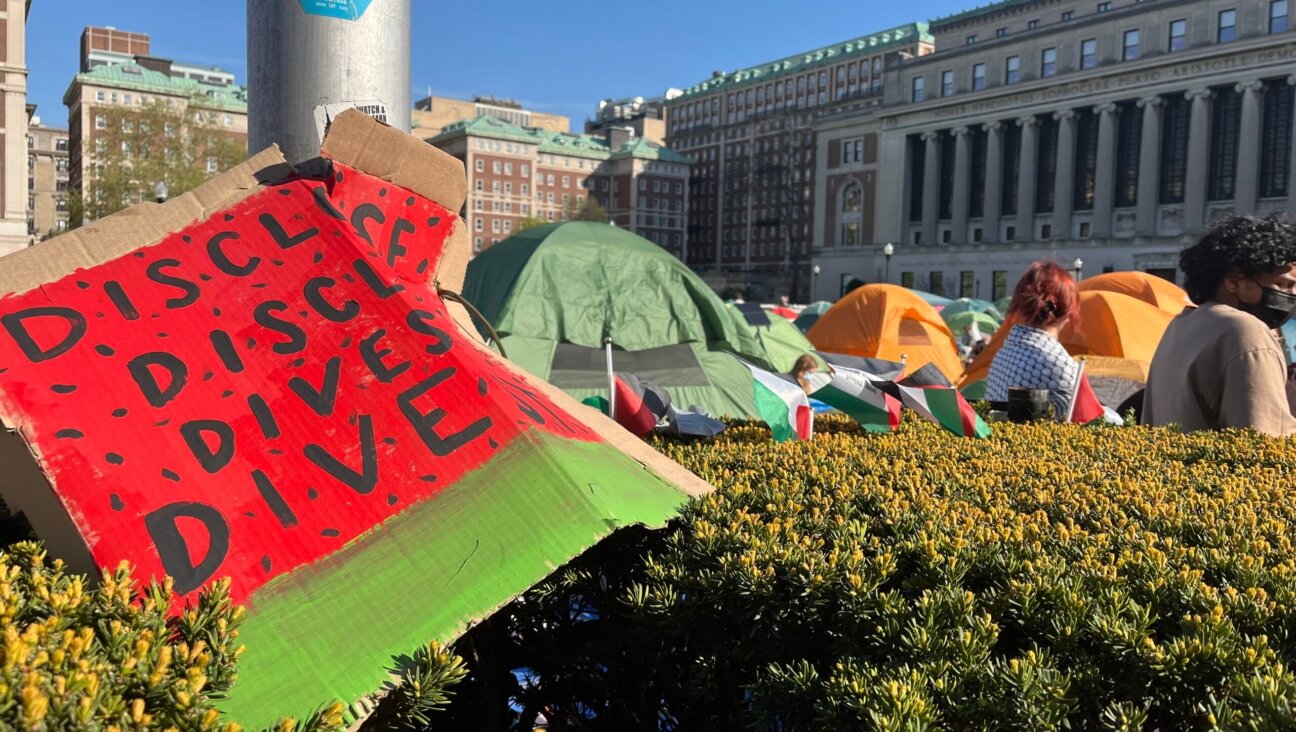Synagogue Leader ‘Aghast’ at Sale of $7M Torah Bells

Image by Stephen Brosnahan/ GW Institute for Religious Freedom
A long-running dispute over the ownership of the oldest U.S. synagogue played out in court on Monday as leaders of the New York congregation that holds the deed to the historic Rhode Island house of worship said they were horrified that local congregants had tried to sell valuable religious artifacts.
Congregants of the Tuoro Synagogue in Newport, Rhode Island, founded in 1763, have defended their attempt to sell bells with an estimated worth of $7.4 million, saying the money was needed to maintain the historic two-story building.
A civil trial that began last week at U.S. District Court in Providence, Rhode Island, has set New York’s Congregation Shearith Israel, which holds the deed to the Tuoro Synagogue, against Newport’s Congregation Jeshuat Israel in a battle for ownership.
Michael Katz, vice president of New York’s Congregation Shearith Israel, testified on Monday that he and other congregation members were shocked when they learned in 2012 that the Newport worshipers planned to sell the temple’s ceremonial bells, called “rimonim,” to Boston’s Museum of Fine Arts for $7.4 million. The sale has since been canceled.
“We were aghast they could do this without informing us,” Katz said. “We own them. Just as importantly, we do not sell our religious objects. It’s a very strong principle. If you’re paying ransom to a kidnapper, you can sell religious objects. Otherwise, you cannot.”
Lawyers for Newport’s Congregation Jeshuat Israel charge the New Yorkers contribute almost nothing toward maintenance.
“Jeshuat Israel is just one unforeseen expense away from financial disaster,” they said in a pretrial filing.
Congregation Shearith Israel is seeking to block the sale of the bells and to evict the Newport congregation. Congregation Jeshuat Israel has countersued.
The Tuoro Synagogue traces its roots to Jewish settlers who arrived in colonial Rhode Island in the 1600s, at a time when it was one of the few British colonies in North America that allowed religious freedom.
President George Washington wrote to the congregation in 1790 assuring them the fledgling U.S. government “gives to bigotry no sanction, to persecution no assistance.”
By the early 1800s, most of the Jewish families in Newport had moved away. Ownership of the temple was transferred to Congregation Shearith Israel in New York, the nation’s oldest Jewish congregation, and the doors were closed. In the later half of the 19th century, as the seaport city’s Jewish population grew, services resumed.—Reuters
The Forward is free to read, but it isn’t free to produce

I hope you appreciated this article. Before you go, I’d like to ask you to please support the Forward.
At a time when other newsrooms are closing or cutting back, the Forward has removed its paywall and invested additional resources to report on the ground from Israel and around the U.S. on the impact of the war, rising antisemitism and polarized discourse.
Readers like you make it all possible. We’ve started our Passover Fundraising Drive, and we need 1,800 readers like you to step up to support the Forward by April 21. Members of the Forward board are even matching the first 1,000 gifts, up to $70,000.
This is a great time to support independent Jewish journalism, because every dollar goes twice as far.
— Rachel Fishman Feddersen, Publisher and CEO
2X match on all Passover gifts!
Most Popular
- 1

News A Jewish Republican and Muslim Democrat are suddenly in a tight race for a special seat in Congress
- 2

Fast Forward The NCAA men’s Final Four has 3 Jewish coaches
- 3

Fast Forward Cory Booker proclaims, ‘Hineni’ — I am here — 19 hours into anti-Trump Senate speech
- 4

Film & TV What Gal Gadot has said about the Israeli-Palestinian conflict
In Case You Missed It
-

Theater The ‘Glengarry Glen Ross’ revival has us wondering — where are all the Jewish Shelley Levenes?
-

Books From an Italian Holocaust survivor, a Kafkaesque nightmare of imprisonment under fascism
-

Film & TV Why Robby said the Shema on ‘The Pitt’
-

Yiddish World Children taking part in a Seder while hiding from the Nazis
-
Shop the Forward Store
100% of profits support our journalism
Republish This Story
Please read before republishing
We’re happy to make this story available to republish for free, unless it originated with JTA, Haaretz or another publication (as indicated on the article) and as long as you follow our guidelines.
You must comply with the following:
- Credit the Forward
- Retain our pixel
- Preserve our canonical link in Google search
- Add a noindex tag in Google search
See our full guidelines for more information, and this guide for detail about canonical URLs.
To republish, copy the HTML by clicking on the yellow button to the right; it includes our tracking pixel, all paragraph styles and hyperlinks, the author byline and credit to the Forward. It does not include images; to avoid copyright violations, you must add them manually, following our guidelines. Please email us at [email protected], subject line “republish,” with any questions or to let us know what stories you’re picking up.















